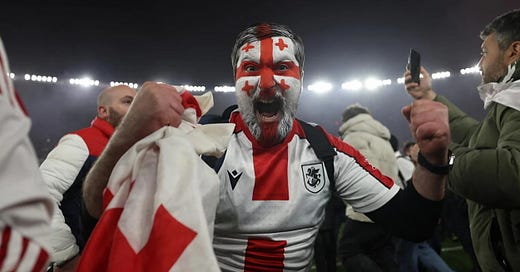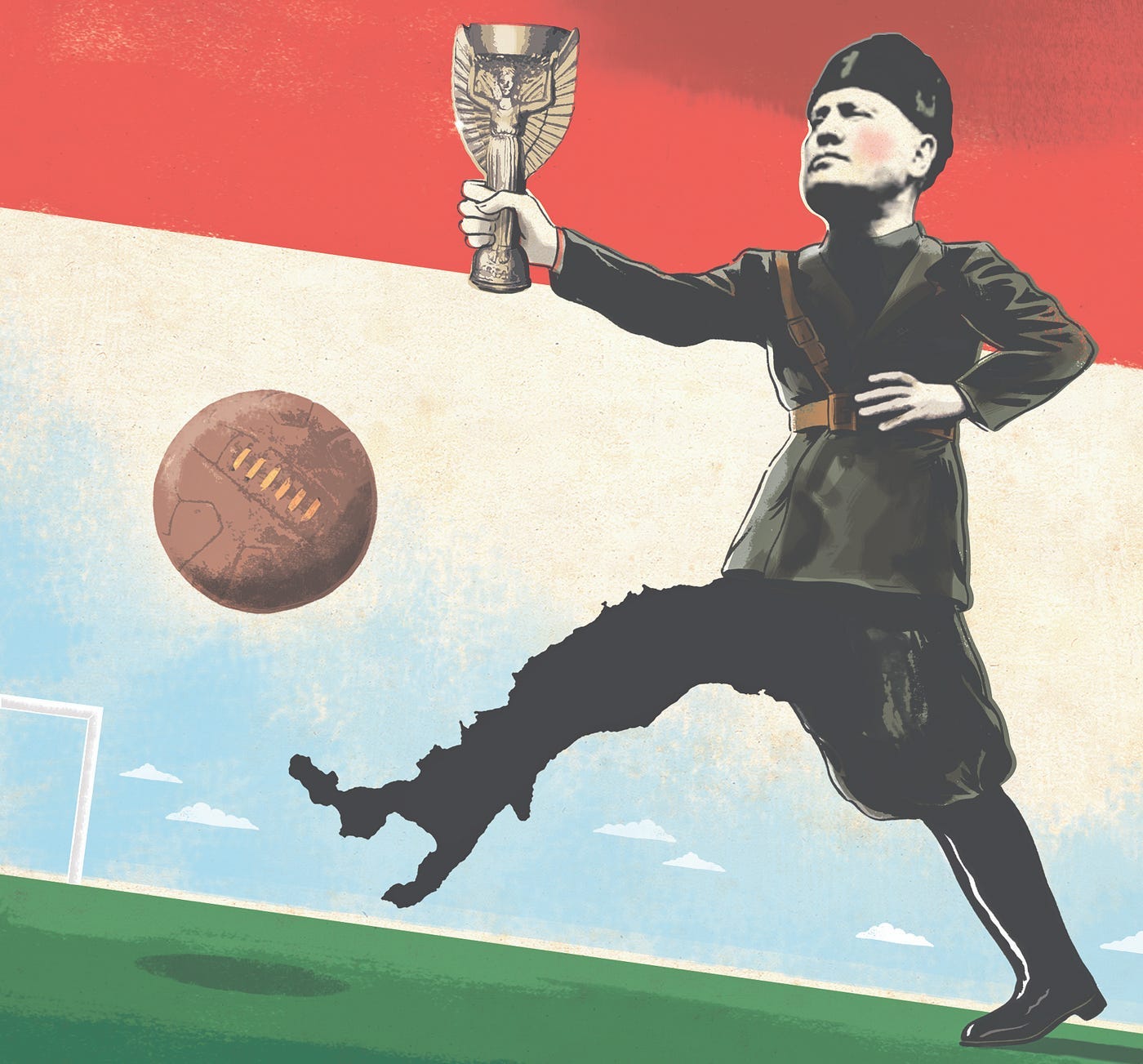Sport as a National Propaganda Tool: The Case of Georgia
Against the backdrop of such a significant political crisis, the Georgian people grasp at any opportunity to satisfy their imperialist ambitions.
Following their victory in the final qualifying match of Euro 2024, the Georgian national football team chanted, "Abkhazia is Georgia." This act is nothing but a feeble attempt to unify the Georgian people by leveraging sporting achievements to promote national-imperialist propaganda amidst a serious political crisis.
It is widely acknowledged that undemocratic regimes use sport as a propaganda tool to stir nationalism, flaunt the supposed superiority of their nation based on sports triumphs, display power, and breathe "new life" into their governance, which suffers from fragile legitimacy, thereby enhancing their image nationally and internationally. Ultimately, all these objectives are united under a common propaganda umbrella.
A classic example of this strategy can be found in Italy under Benito Mussolini. Italy demonstrated the effectiveness of using international sports triumphs for propaganda. The National Fascist Party, branding football as a "fascist game," sought to use it to control public opinion, infiltrate the daily lives of its citizens, and gain advantages on the international stage. The 1934 FIFA World Cup hosted in Italy was a prime illustration of this approach.
Similarly, Nazi Germany employed this tactic effectively during the 1936 Summer Olympics in Berlin, aiming to showcase a strong and unified Germany, especially after the devastation of World War I.

Unsurprisingly, authoritarian regimes continue to use sports as an unmatched platform for their national propaganda.
According to Freedom House, Georgia is classified as "partly free," with the country losing points annually, indicative of an increasingly authoritarian regime. The broader context shows that Georgia is not on the path to democratic development. This is evident in its failed attempts to join the European Union, issues with the fairness of the judicial system, widespread corruption among the elite, lack of transparency, lobbying of controversial bills, and suppression of free media.
Against the backdrop of such a significant political crisis, the Georgian people grasp at any opportunity to satisfy their imperialist ambitions—this time, using their victory in the final qualifying match of Euro 2024, not to unite the Georgian people around a joyful sporting achievement, but to broadcast to the world the nationalist ideology of their ancestors, passed down through generations.
First published by Mediat.ak Instagram channel.
AW's Note: The crowd that turns a sporting achievement into part of a conflict they initiated and escalated should not be upset when they see Abkhazia flags at the matches they will play in EURO 2024. Just a small reminder.
Popular Georgian history is founded on distortions and falsehoods. We see an example of this in the claim repeated below by Civil.ge
Once again we have to note that the non-Georgian population of Abkhazia boycotted and DID NOT TAKE part in the referendum on 30 March 1991. Additionally, this referendum, similarly to the situation with the 1921 Menshevik Constitution, left the nature of the state-legal relations with Abkhazia unspecified.
At the all-Union referendum held on 17 March 1991, 52.4% of Abkhazia's electorate participated, with 98.6% of those voting in favor of preserving the reformed USSR.
According to Law of the USSR of 3 April 1990 N 1409-I "On the Procedure for Resolving Issues Related to the Withdrawal of a Union Republic from the USSR" Article 3:
"In a Union republic with autonomous republics, autonomous oblasts and autonomous okrugs, a referendum shall be held separately for each autonomy. The peoples of the autonomous republics and autonomous formations retain the right to decide independently the question of staying in the Union SSR or the withdrawing Union republic, as well as to raise the question of their state and legal status. In a union republic in whose territory there are places of compact residence of national groups that constitute the majority of the population of a given locality, when determining the results of the referendum, the results of voting in these places are taken into account separately."
Thus, according to the Soviet law of 1990, Abkhazia had a legal right to secession from Georgia, although it did not get a chance to realise it because of the disbanding of the Soviet Union.
On 9 April 1991, in accordance with the outcome of this referendum, The Georgian Supreme Soviet adopted an act on the restoration of Georgian independence, which Georgia saw as the successor of the Georgian Democratic Republic of 1918-1921. From this moment, the GSSR ceased to exist de-jure. As a result, there were two unconnected states existing on the territory of the former GSSR – Georgia, which had declared its independence and exit from the USSR – and Abkhazia, which remained a subject of the USSR. Consequently, the state-legal relations between Abkhazia and Georgia, which were created and regulated by Soviet legislation, were also brought to an end.
Abkhazia continued to be a subject of the USSR until its collapse on 21 December 1991, and in this capacity participated in the negotiations on reforming the Soviet Union. The Chair of the Abkhaz Supreme Soviet remained a member of the Soviet Federation of the USSR and a member of the Presidium of the Supreme Soviet of the USSR until its collapse. At the same time, Abkhazia did not take part in the presidential elections in Georgia, or in the activity of its official structures. It was obvious that Abkhazia could not be both a subject of the USSR and of an independent Georgia.
Its follows that prior to its admission to the UN, Georgia had had no relationship with Abkhazia, and hence that the recognition on 21 December 1991 by the UN of Georgia’s territorial integrity within the borders of the former GSSR had no legal basis. On the eve of Georgia’s admission into the UN the Chair of the Supreme Soviet of the Abkhaz ASSR, Vladislav Ardzinba, informed the Secretary General of the UN in a letter that there were no state-legal relationships between Abkhazia and Georgia, and that therefore the admission of Georgia into the UN was not legal.
The result of the hasty recognition of the privileged fifteen new [Soviet] states by the world community, on a selective basis with disregarding the fact that many of these states were composed of other entities, such as autonomous republics, regions, and so forth...

For some 60 years Abkhazia was forced to accept the unwelcome status of being a mere autonomous republic with Soviet Georgia (thanks to the ruling of the Georgian dictator Stalin – ‘Iosif Vissarionovich Dzhugashvili’). For daring to defend our interests in the face of Georgian nationalist aggression, we were subjected to 14 months of savagery. In alliance with our allies from the Abkhazian diaspora or Abkhazians’ cousins in the North Caucasus, we succeeded in ejecting the invader and winning the war. All that Georgia under its various leaders/governments has been willing to offer us by way of a settlement is a return to the ‘status quo ante’.
There is not a single example in history where a people after being invaded, losing 4% of their population, and yet finally winning the war have meekly resigned themselves to returning to the status quo ante. Abkhazia will not be the country to set this precedent.
In 1989 at the start of the Georgian-Abkhazian conflict the late Academician Andrei Sakharov in one of his last articles called Georgia a ‘mini-empire’ (Ogonёk 1989, 31). Later, describing the relationship between Abkhazia and Georgia, he wrote: "I tend to justify the Abkhazian position. I think we should regard with special attention the problems of small peoples: freedom and rights of big nations should not be exercised at the expense of small ones" (Znamya, 1991, No.10, p.69).
Currently, the European Union, while distributing a Freedom of Thought award named after Andrei Sakharov, simultaneously rejects Sakharov's ideas by supporting the Soviet borders established by the Georgian dictator Stalin, once again revealing its hypocrisy.
"...I must go back and talk about the events in Georgia, which have also entered our destiny. In early April, rallies were held in Tbilisi, the reason for which were the demands of the Abkhazians for the separation of Abkhazia from Georgia (and, apparently, transfer to the RSFSR). Abkhazians are a minority in Abkhazia - as they say, in large part as a result of a policy of "Georgianization". The Abkhazians are dissatisfied with the current situation and expressed their demands at a meeting of many thousands in the ancient centre of Abkhazia, Lykhny. But the majority of Georgians (we had the opportunity to verify this) consider it unacceptable to change the existing situation, both for economic reasons and because of fears for the fate of the Georgian majority in Abkhazia. I rather consider the position of the Abkhazians justified. It seems to me that special attention should be paid to the problems of small nations, the freedom and rights of large nations should not be exercised to the detriment of small ones."
― Andrei Sakharov Gorky, Moscow, and next Everywhere (А.Д. Сахаров. Горький, Москва, далее везде).







